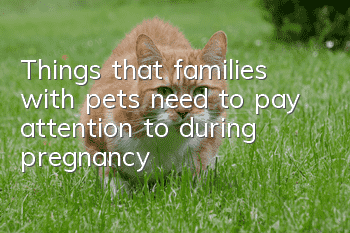Things that families with pets need to pay attention to during pregnancy

I believe that many pregnant mothers like small animals and may already have their own cats. But after you become pregnant, you may receive advice from family and friends who want you to give the cat away.
But is it true that you can’t keep a cat during pregnancy? What should you pay attention to when raising a cat?
Let’s listen to what Chen Ying, a university obstetrics and gynecology teacher, has to say.
The emergence of cat litter allows cats to go to the toilet at home, making it possible to keep cats at home. Cat Stars have become one of people's favorite pets.
Everyone’s concerns about keeping cats during pregnancy mainly stem from a parasite that cats may carry: Toxoplasma gondii.
Why protect against cats but not against dogs?
Toxoplasma gondii can infect almost all warm-blooded animals (mammals, birds, etc.), and about one-third of the world's population is chronically infected with Toxoplasma gondii.
Healthy people infected with Toxoplasma gondii are mostly latent infections, but for patients with low immune function or pregnant women, it may cause serious complications or even death, and may be transmitted to the fetus in utero, causing fetal and neonatal morbidity. disease. Therefore, pregnant mothers are right to be cautious.
In addition, cats are the final host of Toxoplasma gondii. Simply put, only cats can excrete infectious feces, and dogs cannot...
How do people become infected with Toxoplasma gondii?
There are many ways for people to be infected with Toxoplasma gondii, there are two main ways:
1. Cats that are infected for the first time may excrete oocysts (similar to eggs) containing Toxoplasma gondii. If eaten by humans, they may be infected with Toxoplasma gondii.
The average time it takes for a cat to excrete oocysts is about 2 weeks, and about 10 million oocysts are excreted every day, which can last for 10 to 20 days. Don’t believe what is said on the Internet that cats only excrete Toxoplasma gondii once in their lifetime.
Oocysts outside the body become infectious within 1 to 5 days due to differences in environmental temperature and humidity.
Infectious oocysts are also exceptionally long-lived, surviving up to 54 months in cold water and 18 months in soil. Ultra-long standby time...it's impossible not to prevent it.
Therefore, if your cat was infected with Toxoplasma gondii during your pregnancy, it is still very contagious.
2. There are Toxoplasma gondii cysts in infected animal meat (cattle, sheep, dogs, etc.). People eating such undercooked raw meat is another main way of infection.
Therefore, the statement on the Internet that one can be infected with Toxoplasma gondii by eating raw cat feces is also wrong.
You may be infected with Toxoplasma gondii if you eat contaminated fruit, drink contaminated raw milk, come into contact with contaminated soil and eat it, etc.
How should pregnant mothers avoid
Infected with Toxoplasma gondii?
1. Pay attention to your cat’s food
Cats must first be infected with Toxoplasma gondii before they can infect humans. Preventing cat infection is the most important thing!
Cats themselves mainly get the disease by eating infected raw meat, in addition to contact with infected cat feces and direct contact with soil and water containing insect eggs in the wild.
Therefore, controlling your cat’s food sources can greatly reduce the possibility of infection.
Simply put, you need to do the following three things:
① Do not feed live animals/raw meat to cats.
② Isolate from wild cats, do not have contact with foreign cats, and do not adopt stray cats during pregnancy.
③ Keep cats at home and do not let them roam outdoors.
If you keep a cat at home since birth and insist on feeding it with cat food and canned food, the probability of being infected with Toxoplasma gondii is very small.
2. Dispose of cat poop
Pregnant mothers should try not to deal with mommy's poop themselves. It is best to let family members do it for them. If that's not possible, wear gloves, don't eat until you wash your hands thoroughly, and clean and disinfect the litter tray regularly.
3. Pregnant mothers should not eat raw meat, drink raw milk, or eat unwashed fruits and vegetables; wear gloves when in contact with soil
Specifically, pregnant mothers need to do the following:
① It is not recommended to eat raw meat at any time. When making hot pot, the meat should be thoroughly cooked before eating.
② When cooking, separate raw and cooked chopping boards, and thoroughly wash all utensils that come into contact with raw meat.
③ Wash vegetables and fruits before eating.
④ You cannot drink unsterilized milk, such as raw milk or raw goat milk.
⑤ Wear gloves when gardening or working in soil.
For cat lovers, it is really cruel to be separated from their pets when they are pregnant.
Recognize the dangers, raise cats scientifically, avoid risks, and enjoy pregnancy happily.
- What is the personality of the Korat cat?
- Why cats can’t drink water from plastic bowls because they are prone to black chins
- What to do if your Angora cat twitches while sleeping
- What should I do if my cat recognizes the baby? How to solve the problem of cats recognizing babies?
- What to do about kitten skin diseases
- What should I do if my cat doesn’t eat or drink when he arrives at his new home?
- Signs to determine whether a kitten is healthy
- Why do cats lick armpits with body odor?
- What should I do if my 2-month-old Siamese cat sneezes? Common diseases in cats!
- How long does it take for a kitten to forget its mother cat?



